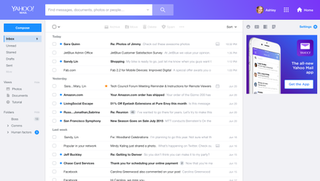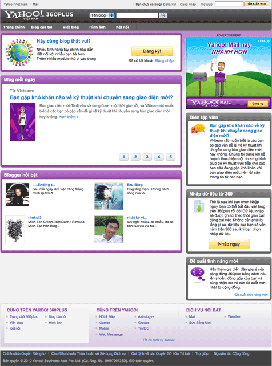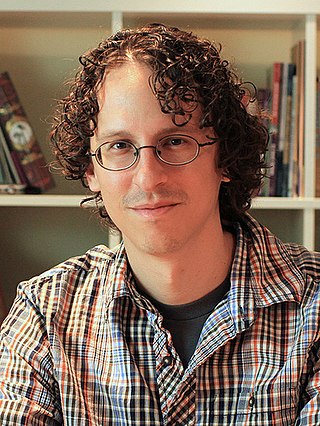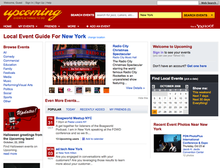
MSN is a web portal and related collection of Internet services and apps for Windows and mobile devices, provided by Microsoft and launched on August 24, 1995, alongside the release of Windows 95.

The original incarnation of Yahoo! Inc. was an American multinational technology company headquartered in Sunnyvale, California. Yahoo was founded by Jerry Yang and David Filo in January 1994 and was incorporated on March 2, 1995. Yahoo was one of the pioneers of the early internet era in the 1990s. Marissa Mayer, a former Google executive, served as CEO and President of Yahoo from 2012 until June 2017.

The name Atom applies to a pair of related Web standards. The Atom Syndication Format is an XML language used for web feeds, while the Atom Publishing Protocol is a simple HTTP-based protocol for creating and updating web resources.

Yahoo! Mail is an email service offered by the American company Yahoo, Inc. The service is free for personal use, with an optional monthly fee for additional features. Business email was previously available with the Yahoo! Small Business brand, before it transitioned to Verizon Small Business Essentials in early 2022. Launched on October 8, 1997, as of January 2020, Yahoo! Mail has 225 million users.

Flickr is an image hosting and video hosting service, as well as an online community, founded in Canada and headquartered in the United States. It was created by Ludicorp in 2004 and was a popular way for amateur and professional photographers to host high-resolution photos. It has changed ownership several times and has been owned by SmugMug since April 20, 2018.

Yahoo! 360° was a social networking and personal communication portal operated by Yahoo! made available in 2005. It enabled users to create personal web sites, share photos from Yahoo! Photos, maintain blogs and lists, create and share a public profile and see which friends are currently online. 360° also featured a 'friends updates' section, under which each friend's latest update was summarized. This service was never officially launched; Yahoo! prematurely stopped developing this service in 2008.
Yahoo! Maps was a free online mapping portal provided by Yahoo! Functionality included local weather powered by The Weather Channel, printing maps, and local reviews powered by Yelp. It shut down on June 30, 2015. For a time in 2019, Yahoo! Maps could be accessed in the United States on https://search.yahoo.com/, albeit powered by Here WeGo. However, that is no longer possible.
Microformats (μF) are a set of defined HTML classes created to serve as consistent and descriptive metadata about an element, designating it as representing a certain type of data. They allow software to process the information reliably by having set classes refer to a specific type of data rather than being arbitrary. Microformats emerged around 2005 and were predominantly designed for use by search engines, web syndication and aggregators such as RSS.

In computing, a news aggregator, also termed a feed aggregator, feed reader, news reader, RSS reader, or simply an aggregator is client software or a web application that aggregates syndicated web content such as online newspapers, blogs, podcasts, and video blogs (vlogs) in one location for easy viewing. The updates distributed may include journal tables of contents, podcasts, videos, and news items.
hCalendar is a microformat standard for displaying a semantic (X)HTML representation of iCalendar-format calendar information about an event, on web pages, using HTML classes and rel attributes.
Yahoo Calendar is a Web-based calendar service from Yahoo!. It can read calendar feeds and events syndicated from sites that make use of the published Yahoo calendar programming interfaces. While users are not required to have a Yahoo Mail account, they are required to have a Yahoo ID in order to use the software. It is one of the largest online calendar providers and serves millions of users.
Yahoo! started at Stanford University. It was founded in January 1994 by Jerry Yang and David Filo, who were Electrical Engineering graduate students when they created a website named "Jerry and David's Guide to the World Wide Web". The Guide was a directory of other websites, organized in a hierarchy, as opposed to a searchable index of pages. In April 1994, Jerry and David's Guide to the World Wide Web was renamed "Yahoo!". The word "YAHOO" is a backronym for "Yet Another Hierarchically Organized Oracle" or "Yet Another Hierarchical Officious Oracle." The yahoo.com domain was created on January 18, 1995.
FeedBurner is a web feed management service primarily for monetizing RSS feeds, primarily by inserting targeted advertisements into them. It was founded in 2004 and acquired by Google in 2007.
Pageflakes was an Ajax-based startpage or personal web portal similar to Netvibes, My Yahoo!, Myhomepage, iGoogle, and Microsoft Live that operated from 2005 until January 2012. The site was organized into tabs, each tab containing user-selected modules called Flakes. Each Flake varied in content; information such as RSS/Atom feeds, Calendar, Notes, Web search, weather forecast, del.icio.us bookmarks, Flickr photos, social networking tools like Facebook, YouTube, Twitter, email and user-created modules. Pagecasts allowed users to share their pages publicly, allowing them to share a curated page of content that would be of interest to others .Pageflakes had 250,000 Flakes and over 130,000 Pagecasts.

My Yahoo! is a start page or web portal which combines personalized Yahoo! features, content feeds and information. The site was launched in 1996 and was one of the company's most popular creations.
Operator was an extension for the Mozilla Firefox web browser. It parses and acts upon a number of microformats, as well as validating them.
The following is a timeline of events of Yahoo!, an American web services provider founded in 1994.

Andy Baio is an American technologist and blogger. He is the co-founder of the XOXO Festival, founder of Upcoming.org, a former CTO of Kickstarter and the author of the Waxy.org blog.

Outlook.com, formerly named Hotmail, is a webmail service that is part of the Microsoft 365 product family. It offers mail, calendaring, contacts, and tasks services.











